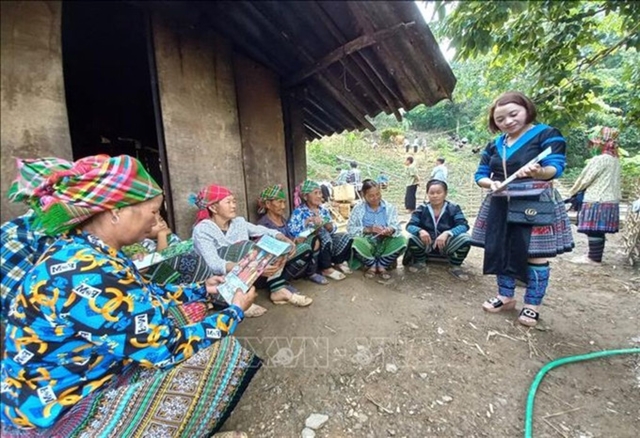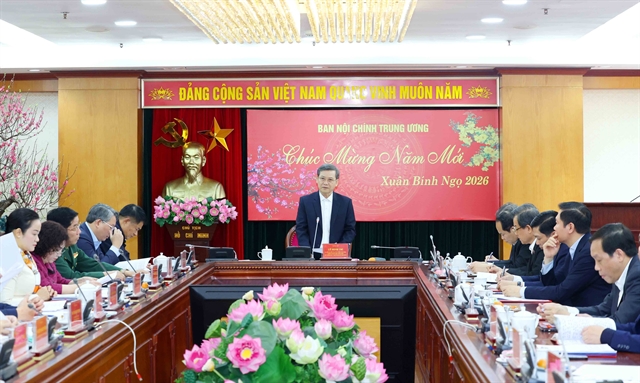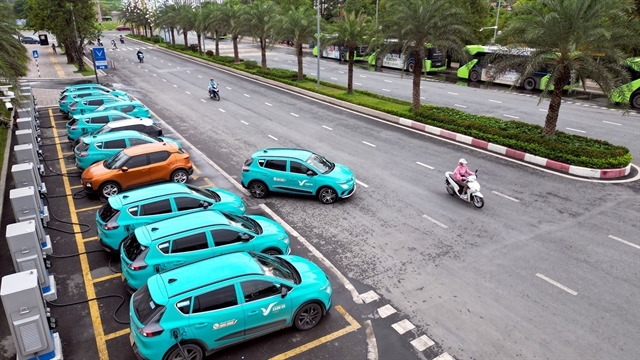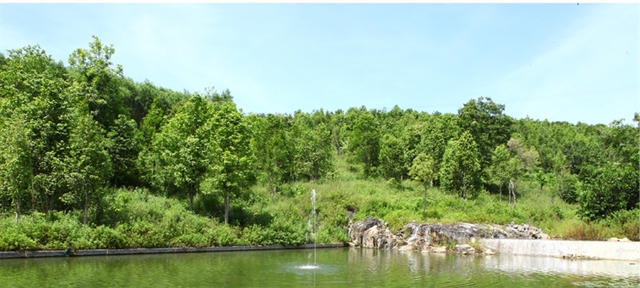 Sunday/Weekend
Sunday/Weekend

By Công Thành
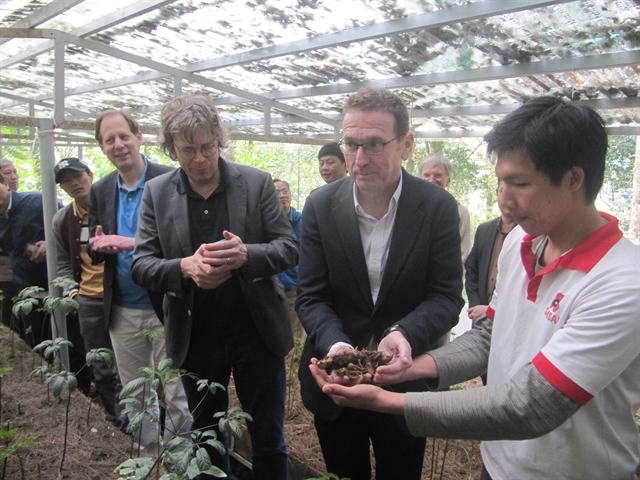 |
| PLANTING FOR THE FUTURE: Nguyễn Hữu Quý Khang (right) introduces ginseng saplings at the mountainous Ngọc Linh ginseng farm in Quảng Nam Province's Nam Trà My District. VNS Photo Công Thành |
In the midst of the global COVID-19 pandemic, Nguyễn Hữu Quý Khang, 31, a construction engineer, found himself unable to return to his work in Japan, and instead found a temporary job at a Ngọc Linh ginseng farm in Nam Trà My District of Quảng Nam.
He soon fell in love with work on the mountainous ginseng farm, tending and nurturing the ancient medicinal herb believed by some to have almost magical qualities.
Khang's new role saw him explore the natural conservation of Vietnamese ginseng (Panax vietnamensis), growing strongly and sustainably in the primary forest.
At first he found being away from Japan difficult, but the work on the Sâm Sâm Company ginseng farm soon grabbed all his attention.
“It’s a turning point. I thought I would just be working on the farm while waiting for Japan-Việt Nam air services to resume after the pandemic. However, the wild nature of my homeland soon fascinated me,” Khang said.
“I restarted as a beginner in farming. It was quite different to engineering work that I had experienced in Japan. I loved exploring the co-existence of the flora habitat and ginseng. It was like caring for a newborn baby.”
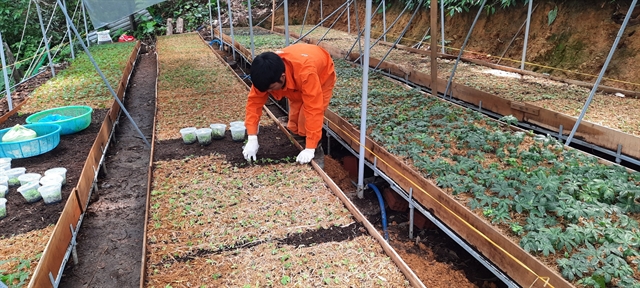 |
| HERBAL LIFE: A worker checks the quality of ginseng saplings at the Sâm Sâm Company's farm in Quảng Nam Province. Photo courtesy of Sâm Sâm Company |
Khang said he spent most of his time on the farm observing ginseng seeds sprouting. Saplings are very sensitive to any small temperature changes in the foggy mountain air, where sunlight hits for just a few hours each day.
“We built up a scrutiny process to watch the saplings at every moment in the forest canopy farms, while arranging long-term nutrition and pest protection. Ginseng sprouts die if they suffer from plant fungus at any time. Rodents are also a threat,” he said.
As a technical manager of the farm, he also trains local workers on how to develop ginseng as a sustainable crop for the community, rather than lazily making money from illegal logging and hunting.
Khang said the farm had developed on one-hectare pilot plot before expanding as a high-yield business and community joint-venture farm.
Hồ Văn Khuyết, 40, a member of the Xơ Đăng ethnic group in Trà Linh Village, said he was trained in sustainable agricultural practice at the farm for two years.
“Most local villagers lived by exploiting forest products including animal hunting for food in the jungle, but the strict rules of forest protection stopped us from living this life,” Khuyết said.
“We had to do odd jobs in urban areas instead. However, we struggled with poor education and skills in urban and industrial parks. Our forest-based experience was always our best skill.”
He said the ginseng farming project offered an opportunity for ethnic communities to improve their income with their traditional forest knowledge.
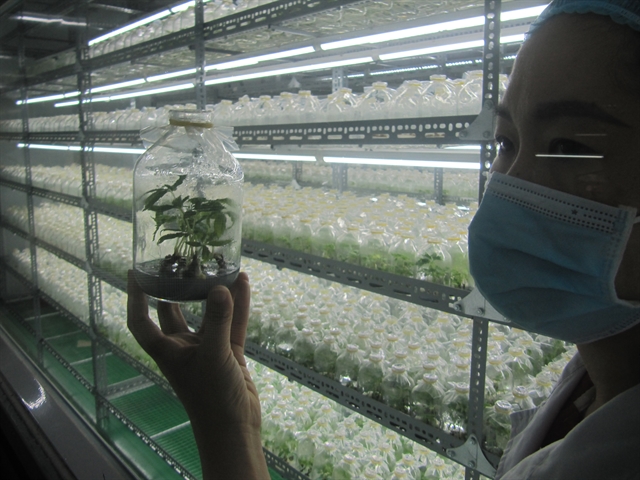 |
| BOTTLING IT: A female expert introduces a ginseng sampling produced in-vitro at Sâm Sâm company's R&D centre. About 5 million of saplings will be produced by the company in the near future. VNS Photo Công Thành |
“It took me one year to complete training in ginseng farming. We can earn well from working on the ginseng farm, while protecting the forest, our spiritual ‘home’, for future generations,” he said.
Global value
In building a national high-quality ginseng brand, Sâm Sâm has grown 500,000 ginseng plants on a 200ha farm in Trà Linh mountainous village.
The company has put into operation the first Ngọc Linh ginseng production facility – a major high-tech processing factory combined with a nursery and research centre – at Tam Thăng Industrial Park in Tam Kỳ City, producing 200,000 capsules and 5 million Ngọc Linh ginseng saplings by in-vitro every year.
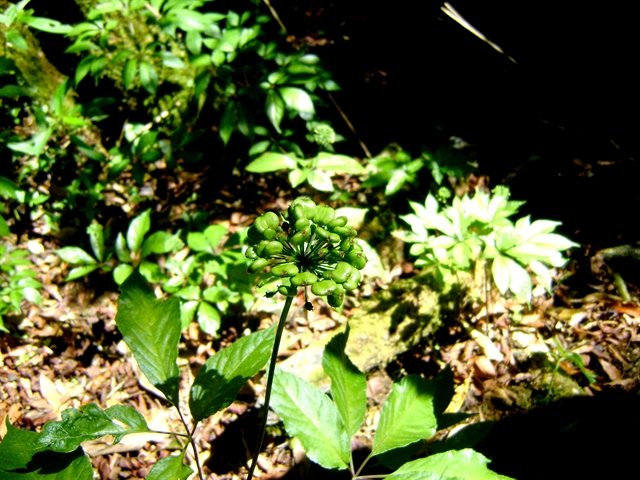 |
| GREEN GOLD: Ngọc Linh ginseng blossoms at a farm in Nam Trà My District of Quảng Nam Province. Photo courtesy of Xuân Thọ |
The sustainable ginseng farm has been listed as one of 20 safe and one of eight Asian projects jointly assessed and financially supported by the World Wild Fund for Nature (WWF) and the Dutch Fund for Climate and Development (DFCD).
Experts from the DFCD and WWF-Vietnam recently paid a field trip to inspect technical and financial support for the project. The DFCD has approved a support grant for Sâm Sâm, seeking to scale up its production in one of the country’s poorest regions. The money will help the company to acquire seedlings, seeds, earthworm compost and land for expansion.
The project is aided by the World Wide Fund for Nature Netherlands together with SNV Netherlands Development Organisation to nurture new projects for the investment fund. With the approval of the grant, the WWF plans to sign a 275,000-euro grant agreement with Sâm Sâm.
Huib Jan de Ruijter, senior expert from the Dutch Entrepreneurial Development Ban (DEDB), said the project developed by Sâm Sâm offered benefits to the local community, particularly in terms of protecting the forest and mitigating climate change.
Aart Jan Mulder, portfolio manager from DEDB Bank, said the ginseng project was unique in the well-protected primary forest as it helped conserve nature, while creating benefits for both business and the indigenous community while reducing the damage caused by climate change.
.JPG) |
| WINDOW TO SUSTAINABILITY: A check-in spot in Ngọc Linh ginseng farm in Trà Lĩnh Village. The forest canopy ginseng farm expects to promote eco-tour service in the province. VNS Photo Công Thành |
Stuart Beavis, regional lead at WWF Asia said: "Sâm Sâm has the potential to be an amazing project. It grows ginseng under the now protected canopy of the forest and works closely with the locals, adding to their skill set and income. The company is also perfectly aligned with the national government's vision for this commodity."
The chairman of the company, Nguyễn Đức Lực, said the combined investment of farm-production plant R&D and the in-vitro centre would help build global production chains for the national brand and boost sustainable development of the Ngọc Linh ginseng not only for Quảng Nam, but nationally.
“We have been building a long-term strategy for a national brand of high-quality Ngọc Linh ginseng production from seed selection, planting and harvest, to storage and processing,” Lực said.
He said at least 80 per cent of natural forests were well protected by local farmers who joined the ginseng farm as the plant could only develop well under forest canopy from 1,400m to 2,500m above sea level,” Lực said.
“As ginseng can die by chemical fertiliser, the ginseng farm is fertilised by organic earthworms. The farm will help contribute to Việt Nam’s zero carbon targets."
The ginseng farm will also be recruiting and training manpower from the Xơ Đăng, Ca Dong and M' Nông ethnic communities across several local villages, hoping to develop more medicinal herb farms. — VNS

